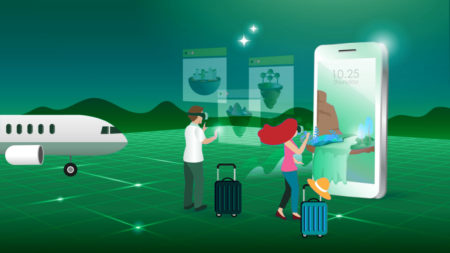By design, the Metaverse is a decentralized ecosystem, but that doesn’t mean that the various platforms won’t eventually be connected as organizations iron out interoperability issues.
To that end, several use case-specific definitions of the Metaverse have emerged. In this article, we’ll cover them and a handful of others we’ve coined that provide a complete picture of the Metaverse and the opportunities within it.
While a seamless Metaverse browsing experience is on the horizon, various use cases are emerging. Today, one of the best ways to determine how your organization can utilize Metaverse technologies is to approach them from a use-case stance.
One term we’ve left out is “Consumer Metaverse,” even though it’s becoming used increasingly to differentiate between practical and profitable Metaverse experiences. The trouble is, as you’ll read, the lines are far more blurred to differentiate the Metaverse so simply, and various industries, such as healthcare, straddle multiple definitions.
The Industrial Metaverse
The Metaverse enables technologies deployed in the industrial sector to become virtualized. The manufacturing industry is perhaps the biggest winner in the Industrial Metaverse if nothing more than for the enormous savings it can potentially make.
One of the core elements of the Industrial Metaverse is the concept of digital twinning. With digital twins, manufacturers can create virtual models of existing or emerging products, saving time and money. Accurate digital twins can also ensure safer products because more tests can be completed by more people working collaboratively, anywhere in the world.
Beyond this, the Industrial Metaverse incorporates augmented reality (AR), mixed reality (MR), and virtual reality (VR) technology that workers can use in the field. AR could enable surgeons to overlay digital notes during operations in the healthcare sector, and engineers could virtually explore inside gas pipelines. An expert in the U.S. could even use AR to diagnose a critical fault in a European power station.
The Enterprise Metaverse
More of a catch-all term than the others we cover in this article, the Enterprise Metaverse refers to brand representation. Many well-known companies have begun to develop a presence in the Metaverse through various means, some more successful than others.
An Enterprise Metaverse, in today’s sense, is a third-party space that enables companies to develop a virtual presence and migrate business opportunities from Web 2.0 to Web 3.0. This could be an event space, a virtual shop, a pop-up experience, or another avenue.
Much of the Enterprise Metaverse is purchased through virtual real-estate bids. In the future, however, the term Enterprise Metaverse will likely refer to the individual Metaverse platforms developed by unique brands.
The Entertainment Metaverse
Many existing brands use entertainment — particularly gamification — in the Enterprise Metaverse to market their products, but the Entertainment Metaverse is nevertheless a separate category. It refers to a specific use case when users enter the Metaverse for entertainment, not retail, purposes.
The Entertainment Metaverse includes event spaces, art galleries, movie theatres, immersive video games, and more. In terms of games, it refers to games that are purpose-built by developers to provide experiences that users can only have in a Metaverse setting. Not brand-focused experiences that aid marketing efforts.
The Social Metaverse
The Social Metaverse is about interaction, and it encompasses users’ intent to socialize as avatars in various virtual settings. The Social Metvaverse will inevitably become intertwined with, and probably hijacked by, social media as the major players in the sector migrate into virtual environments.
However, the Social Metaverse today incorporates the many hang-out spots, meeting areas, communal spaces, and collaborative working environments hosted on the many public and private Metaverse platforms. Business leaders can adopt a Social Metaverse perspective when considering remote and hybrid work opportunities alongside their Enterprise Metaverse activities.
The Investment Metaverse
Although not representing a specific type of virtual world, the Investment Metaverse does embody a very particular use case. It refers to the various investment opportunities in the Metaverse and options that can be profitable for companies that may not wish to have an overt presence.
There are many investment opportunities in the Metaverse including NFTs, Metaverse tokens, DeFi loans, and other instruments, virtual real estate, start-ups, and more. The Investment Metaverse enables companies to experiment, explore, and profit from the Metaverse without committing to a public migration too soon.
Want to compete in the Metaverse? Subscribe to the My Metaverse Minute Channel:









